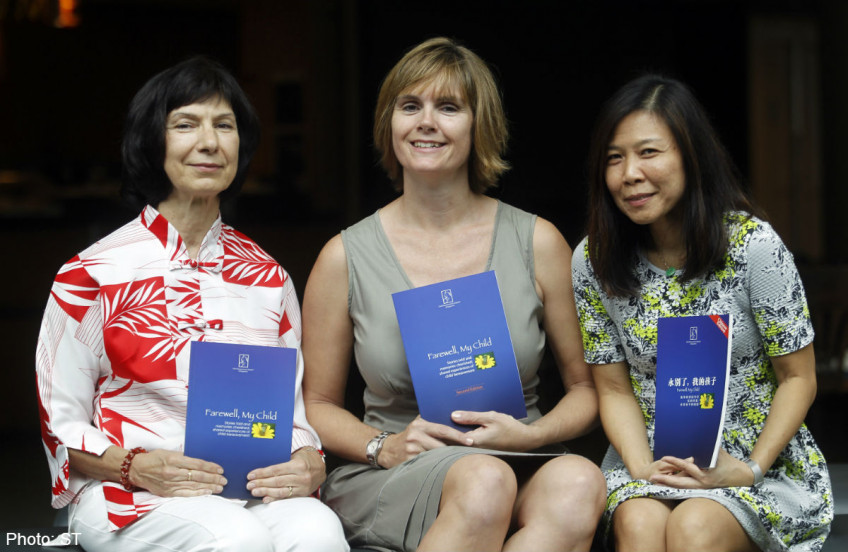When a child dies


SINGAPORE - After her 16-month-old baby girl died in 1999 from a viral infection, Ms Valerie Lim reached out to hospitals in the hope that they could connect her to support groups to help her deal with the grief.
The 51-year-old still remembers the response she got then.
"Did your daughter die in our hospital?"
And she was turned away.
"I looked all over for a support group here, but there was none," says the mother of two sons, Noah, 14, and Toby, 12.
It was only four years later, in 2004, that a mutual friend introduced the housewife to another mother, Ms Sonya Szpojnarowicz, who experienced a similar tragedy.
In 2002, the British national lost her two-year-old son, Max, who died in his sleep after showing symptoms of a cold.
Ms Szpojnarowicz spoke to Ms Lim in the hope of getting a Singaporean perspective on creating a bereavement support group.
Together with four other expatriate women who had each lost a child, the two then set up the Child Bereavement Support Singapore.
It is the only volunteer group here open to anyone who has lost a child, run by parents who went through similar tragedies.
A decade later, it still meets on the second Thursday of each month at the National Kidney Foundation building in Kim Keat Road.
Bereaved parents, some showing up without notice, sit in a circle and take turns to talk about their feelings and how they cope, drawing strength from one another.
A volunteer, who has also lost a child, facilitates the exchange.
Ms Patricia Chiota from the United States is one such volunteer. She has been facilitating such sessions since 2012.
"If someone isn't ready to talk, he or she will just listen and pass when it is his or her turn to speak," says the 65-year-old who works as an editor in a regional consulting firm.
Her 21-year-old daughter Kendra died after being hit by a truck while cycling in California in 2006.
Ms Lim remembers how only a handful of parents here turned up when the group was first established. But she has seen the numbers grow, even though the group does not keep track of actual figures as the parents come and go.
Some got to know of the group through its website (www.cbss.sg), by word of mouth or through hospitals, which keep books the group has published.
The books, available in both English and Chinese, contains stories written by parents about their children who died.
"Some locals believe it is pantang (Malay for taboo) to talk about the dead because you are not letting their spirits go in peace," says Ms Lim, one of two of the group's six founders who are still active, as the others have left Singapore.
But sharing experiences "often helps us face reality, helps us accept what happened... which is so important in the healing process".
"Some parents talk about their guilt. Others are not ready to talk at all. That's okay. At our meetings, we just share things that have worked for us," she adds.
Hospitals have also been contacting the group to find out more about bereavement support.
Later this month, the group will conduct a workshop for Thomson Medical.
What it shares is the personal experience of losing a child. Ms Chiota says those who have not experienced the same grief often mean well but may "end up inadvertently saying hurtful things".
For instance, some tell mothers who miscarry that they can have another child again.
"But this can trivialise the baby's death," she explains.
Mrs Jodi Jonis, 45, attended her first meeting with the support group in 2011, three years after she lost her seven-year-old daughter Katie to cancer.
Mrs Jonis says she never felt comfortable talking about the pain to friends because she thought it was unfair to burden them. But the support group gave her an outlet.
"Every time I tell my story, it makes it just a smidge better. It is a place where culture or religion does not matter. You can just dump it out," says the American housewife, who has a 10-year-old son, Jake.
Now she is among the six volunteers who run monthly meetings, mentor families who have suffered a recent loss, manage the group's website and raise awareness of bereavement support among health-care organisations.
Her contributions to the group are another way which helps her deal with the loss of Katie.
"This is a gift my daughter has given me. I do this work with the memory of her sitting on my shoulders. I couldn't support people if I hadn't lost her," she says.
"I have personally seen and felt the good work that the group does. So how can I not take the hand of a grieving parent and be there for her?"
leepearl@sph.com.sg
This article was published on April 20 in The Straits Times.
Get a copy of The Straits Times or go to straitstimes.com for more stories.